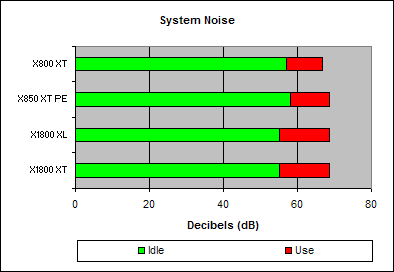Power, Heat & Noise
Here we'll take a look at a few of the environmental effects the graphics board has on its surroundings and the rest of the system by looking at the Power usage, Heat and Noise outputs. Due to the measuring equipment we'll not be able to give definitive quantities solely pertaining to the graphics board, as we are unable to entirely isolate it, so each of the metrics are taken at a system level, however where the same system is used and only the graphics board swapped out we can begin to gauge the effects the boards have in relation to one another. In this instance the core temperature is taken directly from the value reported by the driver control panel.
For the testing of all the elements we took the idle noise level results shortly after boot-up, by placing the noise level meter at the bottom of the case, the case side was then placed on and the power and temperature readings were taken. 3DMark03's graphics intensive Game Tests were then looped through 4 times, to load up the graphics, and then on the fifth run of Game Test 2 the power reading was taken, the system temperature read, and finally the case side removed and the noise level measured. 3DMark03 is used as it has a fairly low CPU utilisation, placing much of the emphasis on the graphics capabilities.

| System Power Use (W) | X1800 XT | X1800 XL | X850 XT PE | X800 XT |
| Idle | 161 | 137 | 126 | 113 |
| Use | 270 | 244 | 246 | 237 |
| Increase | 109 | 107 | 120 | 124 |
At 625MHz and 512MB of DDR RAM running at 750MHz, obviously the X1800 XT has the highest power utilisation at high loads, as well as idle loads. The X1800 XL is the next highest consumer under idle loads, but uses just a little less than the X850 XT PE at high loads.

| System Temperature (Degrees) | X1800 XT | X1800 XL | X850 XT PE | X800 XT |
| Idle | 24 | 24 | 24 | 24 |
| Use | 31 | 31 | 31 | 30 |
| Increase | 7 | 5 | 7 | 6 |
Looking at the case temperatures we see a similar trend with all of the boards, with them being roughly the same. Although the X1800 XT is going to be giving off more heat, like the X850 XT PE it has a heatsink fan mechanism that exhausts out the back of the case, helping to regulate the temperatures a little.

| System Noise (db) | X1800 XT | X1800 XL | X850 XT PE | X800 XT |
| Idle | 55 | 55 | 58 | 57 |
| Use | 69 | 69 | 69 | 67 |
| Increase | 14 | 14 | 11 | 10 |
As with the case temperatures, the case noise levels are all very similar as well, with the X1800 XT having the same fan assembly as the X850 XT PE, which has proven that it can be fairly quiet at low utilisation periods, but obviously speeds, hence increases in volume, at higher speeds. Although, according to these readings, the X1800 XL wasn't any louder than the rest, due to the nature of the fan it employs it has a higher pitch that can be more noticeable, especially when it steps through the various preset speeds dependant on the core temperatures.
At present ATI do not clock down their desktop boards when just running in 2D desktop modes, meaning the core and memory speeds are constantly running at their high set rates. However, ATI have promised to introduce this in a future revision of Catalyst drivers which should result in lower idle power consumption, and lower temperatures, hence potentially lower fan speeds, in 2D modes as well.
